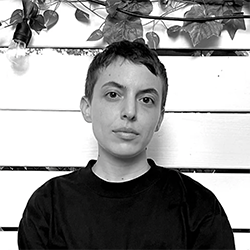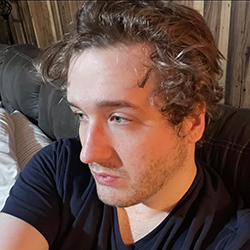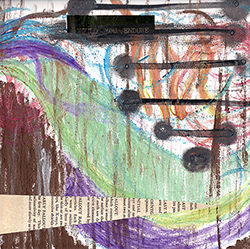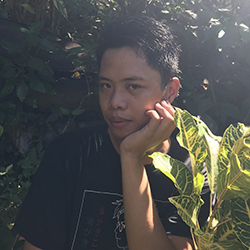Untitled
minimal sense that beings are, oil on canvas, October 2019 [ Grey essay ]
I watched, from the shower floor, L. wash himself. Or, from the position of a stricken eagerness,
a putrid bloating awareness, that results from a combined misery of betrayal and immediate massive caesura that is the beginnings of inverting anything locable that would maintain the moral stance of having been betrayed.
I sat on the shower floor. From this position, I watched L. wash himself.
Perhaps it was not stricken eagerness of having been betrayed, downdrafts of embarrassment stimulating vigil, but consequential, incredulous strains of tamping-disavowal, something more active than denial, that led to a period of months in which my brain, like an idly receptive camera screen set on an overbright room, variously focused glitchy mists. Things occasionally pulsed as recognition—ideas, persons. Then nothing.
My memories that are most sensorially faceted unfortunately are ones in which lucidity was motivated by overwhelming fear. The rainbowic suds that marbled L.’s concave asscheek and formed raspberry-like bubble clusters in his thin bronze hairs. Milder occasions—shadow lights
that get caught around my ceiling beams, indigo shampoo bottles clustering my shower
window—aren’t so crescive.
Why think of syntax? Emmanuel Levinas, in On Escape, does not write that one’s linguistic
status—self as textual ‘I’—produces need for excédence. Yet, Eugenie Brinkema rewrites
Levinas’s assertion of the need to escape as a radical suffering to-not-be-where-(what)-one-is. Could the –where-(what)- of Brinkema’s paraphrase betray being ‘one’ as linguistic bearing, acute and committing? Yet in this, there is—even by I’s striated willingness to remain—a knowing, from syntagmatic calyx or quick, of something less (or not of need).
I wonder if this insistent alignment of agency and visuality could loosen. Attended by that happy
red glare. If letters are the bodily extension that simply cannot be said to belong to any one person, it is a delusion to think they could be used to dominate. Or is this what they’re meant for?

TWOMBLY’S CATULLUS LOOKS AS THE FOGS OF ENCHANTMENT
I don’t experience myself as a continuous subject but I do continuously experience pain.
Pain is reliable, but frustratingly solicitous.
Submissiveness is a shorthand for openness to pain. One wants to work against passive
obedience. The [toxic] [belittling] faithfulness of imperviousness, the strata of unfelt
[self-made]. Can another supersede my relation to my own pain by surpassing it in
intensity?
People don’t understand the difficulty involved in abstraction; they say, my child could do
that, because it’s an unfamiliar or unapparent kind of labor—using a brush so it doesn’t
leave its trace behind.
Glitchiness isn’t opposed to consistency; glitch affirms underlying simplicity (a grid)
whelmed by the front of dimensionality.
Retinal hysteresis. No longer a question of where to look but how.
ON CHEAP BACKDROPS MY STUDIO RENTED FOR A PRODUCTION OF SLEEPING BEAUTY
Painterly suppression of muscle flexions toward writerly conveyance produces
afterburn—both acts commit disregard for as dependence on surface contact; a tension
that permits attention to the instant a brushstroke grafts, visibly emitting, the dense
eroticism of the concept:
one registers (imitating the properties of the canvas) the modulating application of
pressure together with a line’s control of planar disclosure. Presentiment: forceful
insertion of vantage such that a next word seems my shadow afore.
The shape of erasure’s act, as if to protect against subsumption by the reading eye (of
erasing a word), looks nearer, as a scrim, its opacity paradoxically amplifying a being
there of the word.
A vanishing madeness of the mark (transparency) is essential to effect vibrancy.
Twombly’s finger’s compression of tone, as counterpoint, yields sense of a brush’s
fittedness for—by accommodating or incorporating the surface’s impress (its
unresponsiveness, slight solidity)—representational thoroughness in light pressure,
gliding.
The suction of tone sublimated by unprimed canvas disturbs inclinations to coax
representational scenes, can make time pool.
…
Bream nests, conferva. ? Woke up — (sweat behind knees,
shirt collar) tried for a while to find Thoreau’s
description of a nest in the crossbeams, I remember
a segment of an inexistent, ineffectually coerce a shape
as a psychical wound, not as infarction to vision
bare rafters once motivated a footnote
for Thoreau: How it is Night — in Nest and Kennel — And where
was the wood —. Questions shape inhabitance.
I don’t know what I’m saying and feel a little ill. Became meagerly (or medially?)
satisfied with the notion of (re/del-ate as) a doublet
of delay, if simper, . is one of my favorite shadow-shapes, and I apologize for nothing meaning
…
What does staring feel like to you? do you wish you could instead be the floor mat?
The fever, well, I’ve been thinking about variegation
for years, in relation to it, but also that the scallops of fever have metallic undertows.
The fever I feel I often think together with
‘until’ — ‘that nearer every day, until
the agony’ — a soft fabric is being pulled through your hand, what feeling
arises from loosening your grip? The give
E N D N O T E
minimal sense
The painting title, minimal sense that beings are, comes from Eugenie Brinkema’s essay “Violence and the Diagram; Or, The Human Centipede,” in which she writes, regarding the beginning of the titular movie: “Heiter’s opening pronouncement over this image, ‘Good news: Your tissues match,’ is the brute declaration, without history, blank and without provocation (assertive in the strictest sense), that the conjunctive operation is on the order of the possible. This statement of the pure possibility of joining is articulated over the visual self-evidence of the human form as pure presence: beings figured in the barest outlined difference between the figural and the anti-figural. Violence is possible because of this minimal sense that beings are—the constraint on freedom is declared as an event that requires solely what the visual logic avows: that the human form is” (81).
where-(what)-one-is
Again, from Brinkema’s “Violence and the Diagram,” in which she turns to Emmanuel Levinas’s On Escape, she writes: “The Human Centipede is not about escape-to-some-where in this minor sense, but about a different escape altogether: the brutal aspiring only to get out (sortir) (e, 53). Not to elude or flee the house, the doctor, the shit, the terror, but to evade the structure one is itself—not transcendence, but what Levinas dubs excédence. The violence does not produce a need to go somewhere (else) but rather the radical suffering to-not-be-where-(what)-one-is” (88).
happy red glare
This “happy red glare” is borrowed from Johann Geothe’s Theory of Colours, in which he writes: “The French have a happy expression for the less perceptible tendency of yellow and blue towards red: they say the colour has an ‘un oeil de rouge,’ which we might perhaps express by a reddish glance (einen röthlichen blick)” (214).
erasure’s scrim
My poem title references Cy Twombly’s Say goodbye, Catullus, to the shores of Asia Minor, created between 1972-1994. My mention of erasure’s scrim is informed by Roland Barthes’ book on Twombly, Cy Twombly: Fifty Years of Works on Paper, in which he writes: “[Twombly does] not press down, quite the contrary, [his mark] fades away, while retaining the delicate stain of the eraser’s movement; the hand has drawn something like a flower and then begun ‘dawdling’ over this line, the flower has been written, then unwritten; but the two movements remain vaguely superimposed; it is a perverse palimpsest; three texts […] are here, one tending to efface the other, but only, one might say, in order to show that effacement; a veritable philosophy of time” (165).
dense eroticism
My phrase “the dense eroticism of the concept” is informed by Fred Moten’s description of Sigmund Freud’s oeuvre as producing “the dense erotics of arrangement” in his chapter “The Sentimental Avant-Garde” from In the Break: The Aesthetics of the Black Radical Tradition; more fully: “The density of the miniatures that make up the suite we call An Outline of Psycho-Analysis is rich with the necessity and effect of forming pictures in the terrain in which there can be no question. This is the dense erotics of arrangement, the whole of the text working like the whole of the body working like the whole of the orchestra—a miraculously autoexpansive, invaginative, erotogenic zone”(30).
presentiment
My usage of “Presentiment” is informed by Emily Dickinson’s F487A: “Presentiment – is that long / shadow on the Lawn – / Indicative that suns go / down – // the notice to the startled / Grass / that Darkness – is about – / to pass -” (edickinson.org).
thoreauvian nest
Thoreau describes nests and algae across his journals. Here I refer to Thoreau’s description of his ideal home in “House-Warming” from Walden: “I sometimes dream of a larger and more populous house, standing in a golden age, of enduring materials . . . which shall consist only of one room, a vast, rude, substantial, primitive hall, without ceiling or plastering, with bare rafters and purlins supporting a sort of lower heaven over one’s head; . . . where some may live in the fireplace, some in the recess of a window, and some on settles, some at the end of one hall, some at another, and some on rafters with the spiders; . . . a house which you have got into when you have opened the outside door . . . where you can see all the treasures of the house at one view . . .; A house whose inside is as open and manifest as a bird’s nest” (234).
agonic
I also quote the penultimate stanza to Emily Dickinson’s F327A and the opening stanza to F425A: “‘Twas like a Maelstrom, with – / a notch, / That nearer, every Day, / Kept narrowing its boiling / Wheel / Until the Agony” (edickinson.org).
B I B L I O G R A P H Y
Brinkema, Eugenie.“Violence and the Diagram; Or, The Human Centipede.” Qui Parle, vol. 24, no. 2, 2016, pp. 75–108., doi:10.5250/quiparle.24.2.0075.
Dickinson, Emily. F327A, Emily Dickinson Archive, www.edickinson.org.
—. F487A, Emily Dickinson Archive, www.edickinson.org.
Levinas, Emmanuel. On Escape. Stanford University Press, 2003.
Moten, Fred. In the Break: The Aesthetics of the Black Radical Tradition. University of Minnesota Press, 2003.
Thoreau, Henry David. Walden. Yale University Press, 2004.

Ethan Fortuna is a trans writer and visual artist. He is a Postdoctoral Fellow at New York University and received his PhD in Creative Writing and Literature from the University of Houston as a Cynthia Woods Mitchell Center for the Arts Interdisciplinary Fellow. He was selected as a finalist by Wendy’s Subway for the 2023 Carolyn Bush Award book prize, and his work can be found at Southeast Review, TAGVVERK, bæst: a journal of queer forms and affects, Triangle House Review, and elsewhere.
Two Poems by Eros Livieratos
Melencolia’s Samsara
after Albrecht Dürer’s Melencolia I, 1514
I remember when I was beautiful. I was observed obsessively. My body was an open canvas. My mind was full. I remembered my sisters—their glistening beams of light and the violence they endured. Away from Albrecht, away from the infant, away from the dog—I met with a Boddhisatva. I wished to be empty.
On the day I swallowed the sun, there was a man standing on a hill. He had masturbated to my hips as I began to collapse. The struggle of brushstrokes felt much calmer than these physical pains. When samsara continued, I unraveled the man. My fingers in his core, spinning with the splendor of a pulsar.
When the world went dark, I became the sun. My warmth covered the rapists and the indignant. Hubristic murderers infiltrated my reach. My sides became everlasting highways and so, I covered the rapists and the murderers, and the lovers separated by picnic baskets in late spring where I was expected to be. My expectations outgrew me. I tried my best.
I kissed everyone, the unable and the diseased, the imperfect Adonises and their gender fluid queens. I felt children reaching out for me, small breaths grasping my hued abstractions. When mountain goats kissed the lamb, I began to feel tired. The weight of infinite needs drove down my sides and bit away at my color, I wanted to weep but the form was steam.
Boddhi talked of purpose and place but I, I felt an overwhelming frustration. As if my core was swallowing itself, I wanted nothing to do with form. Samsara continued and I burned the rings of Saturn, locked in intercourse with planetoidal debris. I wept as our bodies entangled, forming spherical vines lit by nameless dead stars. I am tired of the cycles.
When I was beautiful, I wished to live beyond Albrecht Dürer’s Melencolia I. When I walked outside, I found nothing of beauty. I saw the eyes of men and I wanted to save my sisters, to shield them from millennia of responsibility. I became the sun and as the days went, my light turned to decay. Every second was agonizing. Every second was natural. When I returned to the engraving, I was a nameless Venus. My body unrecognizable, my beauty substantial, and my presence—a suffering.
Scorched
If the Earth beneath my feet begins to singe my calloused heels well then let me sing
a song for my students who write poems about dogs and gods and the sun—death!
How beautiful! All of everything can be, I tell myself for my friend with the father
who is dying in a hospital bed, his hands—calloused from the marble tiles he broke
his back laying as if an obsession—a necessity of labor. How beautiful! The open
mouth of the wolf perched on a cliff near the woods where I smoked dirt weed not far
from the motel where politicians met their mistresses, and I bought dirt weed with my brother
who swore his brother would get his shit together. How beautiful! The glare of the sun
on my dashboard where the CD player stalled, and my Mars Volta CD has been swallowed
whole like the open mouth that swallowed compact disc technology whole in the awakening
of spirit that Hegel droned on about. How beautiful! Marx’s little red book in the hands of
the angelic Kahlo—abused repeatedly by a man who excused everything for art’s sake. How beautiful! I live
in a country where God would have made his way into my pants had I not had to bow during the
sacraments. How beautiful! That ethereal church with the shapes the procession made—the priest’s
voice when he told me to get out of the confessional for I—I was not blessed to be. My small hands
flipped through that Bible a hundred times trying to make sense of any of those endless lines.
How beautiful! The angst of reading Dostoyevsky at a bus stop. Dreaming of boys while sleeping
with girls—pushing the boundaries of my body with sharp objects and substances. How beautiful!
The pack of Marlboro Red 100s in my back pocket, crushed with two “Lucky’s” in the front.
A navy-man told me, “One for good luck, one for a good fuck”—oh! How—I feel
the color lilac beneath my flesh between my bones and oh, there’s a brooding beast inside me.
Crushing up powders and minerals and feeding off everything. How beautiful! How beautiful.

Eros Livieratos (He/They) is a Greek-Belizean writer & artist whose work focuses on the intersection of identity, aesthetics, and capital in the Anthropocene. Eros has published poetry, fiction, non-fiction, comics, photography, and film score work. They can usually be found making harsh noise & screaming in your local basement.
One Poem by Jeané D. Ridges
Confessional to Lay My Body Down
(In a Time of Budding Rot a.k.a. Springtime 2023)


Jeané D. Ridges was born and bloomed in the southeast of the land the United States occupies, and it remains where they reside being nourished by soul-filling food and expansive tales. Their poetic storytelling can be discovered in Anathema: Spec from the Margins, Apparition Lit, Neon Door, and Worlds of Possibility—including its first anthology. You can discover more about them and how to connect at jeanedridges.carrd.co.
One Poem by Mathew Yates
dear mud
dear glob of dirt,
make me inert & free,
make me as pretty as the mud
merging with the sea,
dear The Listening Part of the Sky,
make me as hollow as you
& never ask me why,
dear The Dying Time,
won’t you make me rhyme
like the sea & sky at dusk,
& sincerely, must we rush
when nothing can be done at all?
dear lump of mud,
mold me into one
who can rust or bust in half,
but don’t ask me what it means
to become instead of be,
don’t ask me what it means
to want to be incomplete.

Mathew Yates (they/them) is a disabled poet & artist from Paducah, Kentucky with roots in Mississippi & Appalachia. Their poetry & art can be found in Protean Mag, Ghost City Review, Screen Door Review, Malarkey Books, & more (@m_yates).
One CNF Prose Poem by Erica Rivera
ends
there’s a girl out there watching and she is my god. a year of living as my gender and i have not yet died. i don’t want a pushcart or hugo or nebula. i don’t want a nobel or pulitzer, to write a national book. i want to be free. i want you to be free. i want you to be freak, however you please. however you. please. there’s a girl out there watching who gave everything up so she could freak and fuck and please whoever; so you could have what? every pleasure: whenever, wherever. how and who and where and when are all the same—what, did you think synonyms were supposed to be simple? every award is the same: part of apartheids so lovely we’re meant to cheer and applaud. there’s a girl out there watching whom this literally killed, because you can’t break a chain with a word—with the right themed submission call, with the lofi-iest zine from the lowkey-iest distro. but a blade in the right spot will sure as hell do it. i hate to write, i hate to write,and this feels at least as shameful as being trans. there’s no biomedical roadmap to cure my disdain for expression, except maybe stories of sisters refusing to speak—to anyone but each other, in a language their own. there’s a girl out there watching and now probably laughing, saying, “girl, i literally laid the roadmap out for you.” and she did. and she has. i could make more money selling smurf pussy than writing another fucking t-slur-y chapbook, reminds me the priestess of hard-hitting prose. there’s a girl out there watching and no one knows her name except for the people she loves, and i love that for her, maybe someday for me. writing means nothing, but all before/after might; writing is a means, a series of beginnings. like the transition of a gender, there is no such thing as end. instead, there is more. more, more, more—i want for you/me/us more. i want absolutely everything, which is the promise of a friend, of a family, of the mundane. there’s a girl out there watching and she is my god, i don’t whisper her name when i pray anymore, but what’s the use of a whisper when everything’s heard. what’s the use of a language when everyone knows. what’s the use of a fall if nothing gets broken.

Erica Rivera (she/her) is co-editor for Art, Strike!, an online art/literary publication unique for paying collaborators what they ask for out of a shared fund-pool. Her work appears or is forthcoming in Sophon Lit, en*gendered, manywor(l)ds, and The Emerson Review. For fun, she likes to watch TV and pretend all the characters are trans. Her author photo is a rainbow of colors streaming across a brown background streaked with vertical white; a small flame at top-right is fenced by horizontal black lines, the words WOULD YOU ENDURE atop, in white at the base of a black rectangle; a sideways, triangular cut-out of a text on surviving nuclear war slices through the bottom.
Three Prose Poems by Eli V Rahm
Kink
Levi ties me to the bed and all weekend we watch every god-awful movie she wants. Her pick—my body.
She lays the plot out on my belly, traces every character arc up my spine. Kisses me at the credit scene (and only the credit scene).
I learn to survive on popcorn and spit—her bodily excess is mostly water anyway, and salt. Tiny bits of seaweed left stuck in my teeth afterward. If she’s kind, she’ll pick them out with her fingers—every long green tendril. When the final Fin plays, she unravels the rope, rubs aloe on my purple wrists. Asks if I want another marathon, and all I can say is yes, and when.
Point Break
We’re fighting when Levi says she’d rather fuck a machine than me. I throw a vibrating dildo across the room, hear it slam into the wall with a wet thump. Do it then.
I think I’m still scared any argument could be the end—but sometimes Levi just wants entertainment. An adrenaline junkie, something good to get the blood pressure rising.
Now she’s smiling, tries to pull me close despite the sting still in our throats. In this moment, I wonder if I’m the airplane and she’s jumping out—
Or maybe she’s the parachute, the only thing keeping us alive.
Or we’re both just the salt, and the acid, burning away everything inside just to keep kissing a little longer.
Fall
Light maw opening—onyx strike. Levi takes a falling star for an earring. I want to give her something pretty that doesn’t burn but every wound glimmers—blood saliva, heartbeat juice. Bile that hardens to stone. I promise her another ring and with it, she takes a finger—blesses me with her rough forked tongue. I ask how a fish can be so feline and she just meows, slurping another knuckle down her throat.

Eli V. Rahm (they/them) is a queer poet from Virginia. Eli is the recipient of the 2023 Mary Roberts Rinehart Poetry Award and the 2020 Joseph A. Lohman III Award in Poetry. Their work is featured or forthcoming in Passages North, Bellingham Review, Barren, The Academy of American Poets, Portland Review, Feral, among others. You can find them tweeting about horror films and strange animals @dinodysphoria.
Two Poems by Joefel Bolo
Urges to Erect
I was told by elders, what’s more to seek when we slant. Grow big, catch—marry while you’re young—marry Maria, they voiced out of thin air. But I want to secure Juan instead, who wouldn’t pick a fine man and hopes of resting their hands on lush abdomen and shoved the opening to feel his hardness. Yet, splitting is a trace and rub it gently, as his beard is growing, as these itches. The hair down here is desolate. Attachments and whipped with onus to unease. I want to spread this legs and the whole thing I can bid. Embrace me to the barest position, bring fever, bring wetness for the cleanest aroma. Your shoulder drips sweat, now’s my new emperor. I thought of him as him, as god, a role—a beginning concerning a closure. The abstraction, but crushed the bare face, and it was never parched. Old and think about it, I hold this fiction for long time, I suppurated in my reveries. Years to think, I’ll carry this surname, this fantasy, this awakening, but I clung the entrance. This ended for now.
Disparity and Commute
Not the plastic wrapper I swung in the dirty kitchen. Mothering with solace as you demand this delusion and still, birth of questions. Suppose I could wait for a while; I’ll devour pancit to devour endlessness. While body are intact and steady—I am calm. I hear the bliss soaring right next to my thesis of vapid longings. I swear I haven’t seen a face in this dim light jeepney. The sensation apiece time as fear cossets the temper. This pressure, and this essential demise. On their maturity, here’s me, the gore you slit from your insufficiency. Briefly, you invite kindness, from your vital unusual backs, to beg your actions by caressing my head—telling it will be okay. Always kindled with vision, and always wanted to stay away.

Joefel Bolo is a queer writer from the Philippines.

